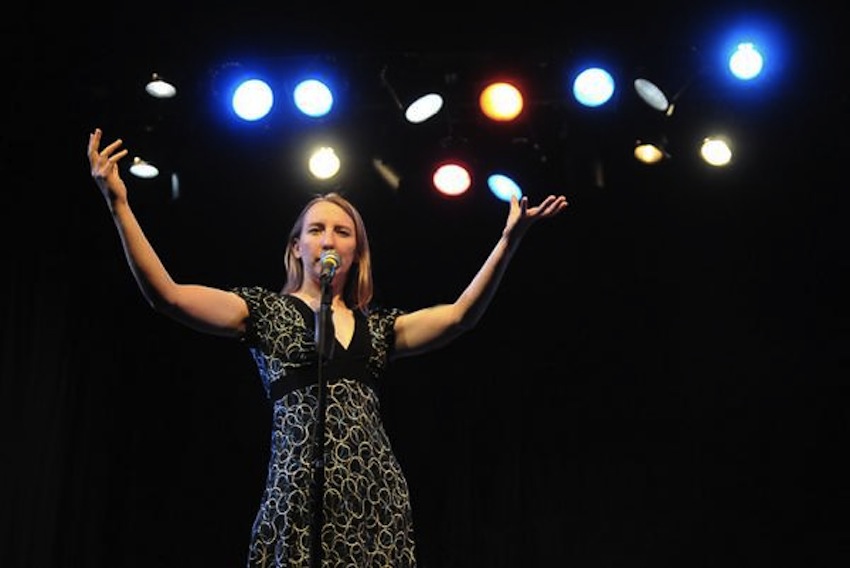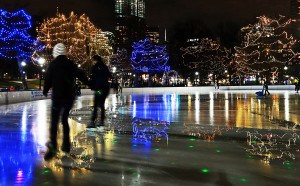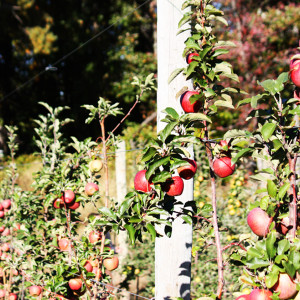The Country’s Largest Poetry Slam Competition Is Coming Back to Boston
In August, it will be impossible not to walk into a bar in the Boston and Cambridge area that isn’t playing host to groups of word-slinging artists equipped with elaborate prose, as the National Poetry Slam Competition returns to Massachusetts for the second time in three years.
“It’s almost unavoidable [the week of the event]. All of the sudden, people will see there is poetry happening at every single one of these venues they try and get into,” says Nora Meiners, of the slam series that will run from August 13 to August 17 at places in Cambridge, Somerville, and Boston.
From “nerd slams,” which incorporate the idea of “nerd culture,” to “rowdy late night events” and open mic sessions that revolve around the spoken word, the competition will bring in some of the biggest names in slam poetry, all to one region. “NPS is the Olympics of the performance poetry world,” said Host City Director Simone Beaubien, who has been the “SlamMaster” for the Boston Poetry Slam at the Cantab Lounge in Cambridge since 2004.
Typically, according to Beaubien, slam poetry competitions are “fast-paced” team performances where poets have limited time to impress the judges with word play that sounds like storytelling and song-writing. “It’s a little theatre, a little rap battle, and a little stand-up-everything,” she said.
Boston welcomed the national competition to the area once before, in 2011, marking it as one of the most successful, and largest-ever poetry events held since its conception in 1990. “When the festival came…we called it a once-in-a-lifetime event. Since then, greater Boston has been turning out for poetry in record numbers, so it’s great for us to have this second rare opportunity to host,” said Beaubien.
The annual slam series is an effort of Poetry Slam, Inc., a non-profit organization. The group gave Boston a second chance to hold the competition and awarded the city the bid for this year’s event just four months after their “record-shattering success “ in 2011, something Beaubien said really showed that Boston was not only a great city to visit to listen to poetry, “but also a great city in which to be heard.”
Beyond being the hub for poetry championship hopefuls from around the country, Beaubien said she is excited to offer Boston another chance to experience the art-form on a larger level. “[Poetry] might have been something people were forced to listen to or write about in the past, and to watch people discover that there’s a whole range of kinds of poetry, the way there is a whole range of kinds of music, is exciting,” she said, adding that this year’s competition will also be in bigger venues.
Meiners, who will also be competing, agreed, and said the event is a chance to open people up to alternative forms of poetry, an art form that can sometimes carry the stigma of being boring or even overly-romantic. “Once people come to the door [of venues], that is often what floors them, and they say ‘I didn’t know poetry was like this, I didn’t know this was so engaged.’ We surprise them and they come back for more,” she says, adding that her own experience with the national competition in 2011 inspired her to continue pursuing poetry writing as a part-time passion.
The series during the weeklong slam are interactive, according to Meiners, because they allow audience members to judge the competition. At each event, five people are picked to give poets feedback on their performances, and based on a scoring method, those artists either advance to the next round or end their pursuit of becoming a slam grand champion. “I think [Boston is] the perfect match for this. I think what happens is, poetry is part of a small literary community here, but bringing the most famous active poets to one location and having people engaged and listening … it’s just something different to do.”



